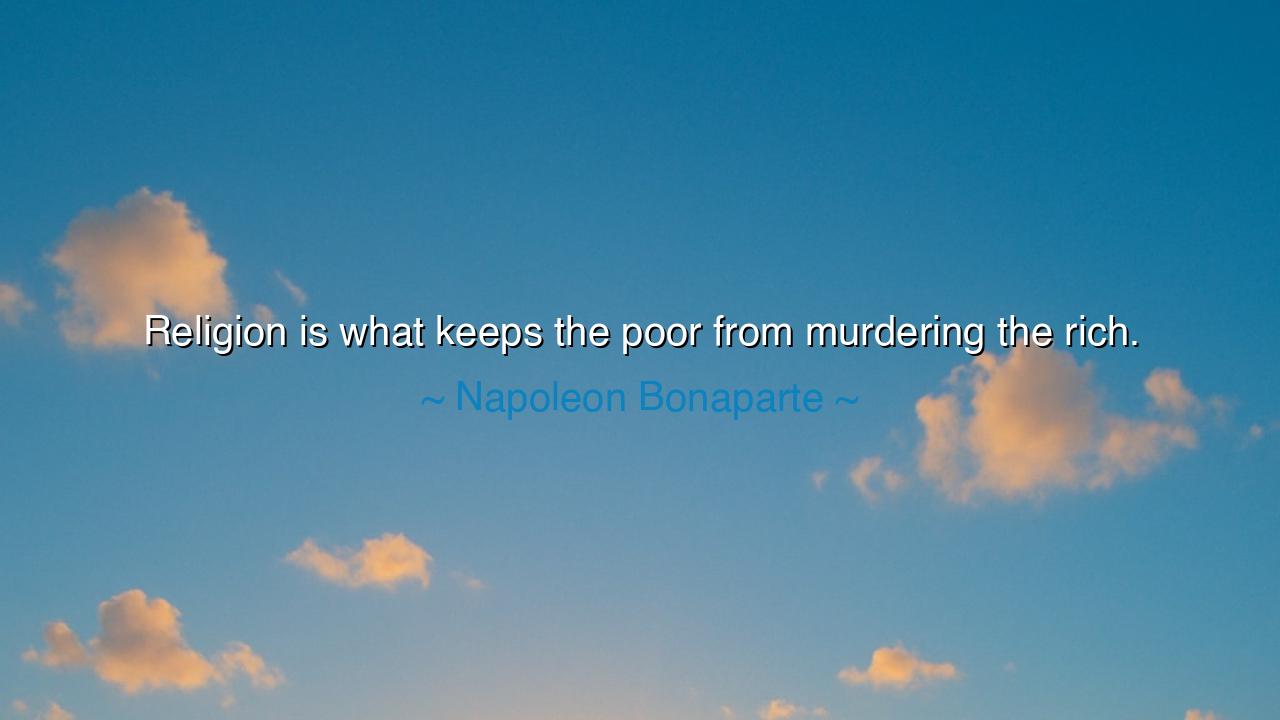
Religion is what keeps the poor from murdering the rich.






"Religion is what keeps the poor from murdering the rich." Thus spoke Napoleon Bonaparte, the conqueror of Europe and the son of revolution, whose words often revealed as much insight into the soul of humanity as into the art of war. In this grim and piercing statement lies not merely cynicism, but the cold observation of a man who had seen the world from the throne and from the battlefield. Napoleon, who rose from obscurity to command empires, understood the frailty of human order and the passions that stir beneath it. His words expose an unsettling truth—that religion, beyond its spiritual promises, has often served as a force that binds society together, restraining the despair and fury of those who suffer beneath the weight of inequality.
When he said these words, Napoleon was not dismissing faith itself, but revealing its political function. He had seen the fires of the French Revolution, where the oppressed rose against the privileged, where palaces burned and kings were led to the guillotine. The old Church, once allied with the monarchy, had been torn down, its altars defiled, its priests hunted. And in that void—where no moral authority remained—chaos ruled. Napoleon, who came to power in the aftermath, knew that human beings, when stripped of both hope and fear, can become as wild as the storm. Religion, in his eyes, was not merely belief—it was order, the invisible chain that held civilization back from anarchy.
To the poor, religion offers not wealth, but meaning—a promise that their suffering is not in vain, that justice awaits beyond the grave, that humility and patience will be rewarded by divine favor. It teaches the soul to endure what the body cannot change. And to the rich, it offers absolution, a moral framework that legitimizes their station as part of the divine plan. In this way, religion becomes a bridge between the classes, preventing envy from turning to rebellion, and guilt from turning to despair. Napoleon saw in it a kind of spiritual governance, a system that rules the heart when laws cannot reach the conscience.
Yet behind these words also lies tragedy. For if faith is used only to pacify and control, it ceases to be sacred—it becomes a tool of the powerful, a veil over injustice. Throughout history, kings have invoked the name of God to defend their thrones, while the poor have been told to bear their chains as the will of heaven. Thus, the divine becomes a servant of the throne, rather than its judge. But true religion, as the prophets have always taught, was never meant to silence the oppressed—it was meant to awaken the conscience of the world. Napoleon’s quote, then, stands as both truth and warning: religion may restrain violence, but it must not be twisted into a cage for justice.
Consider the example of Leo Tolstoy, the Russian nobleman who was both wealthy and devout. In his later years, he saw the same hypocrisy that Napoleon had named—the Church blessing the wealth of the few while the masses starved. Yet instead of abandoning faith, Tolstoy sought to purify it, to restore religion to its true purpose: compassion, equality, and moral awakening. He gave away much of his property, lived simply, and preached that the love of God should lead not to submission, but to mercy and reform. In this, he revealed that while Napoleon was right to see religion as a restraint, he was wrong to believe that restraint must come from fear—it can also arise from love.
The quote, born from Napoleon’s realism, reminds us that every society must find a balance between order and justice, between faith and freedom. Without moral guidance, power becomes cruelty; without compassion, revolution becomes vengeance. Religion, when true to its divine source, teaches that all men—rich and poor alike—are brothers before the Eternal. But when corrupted by greed or fear, it becomes a shield for the privileged and a shroud for the powerless. The lesson, therefore, is not to abandon faith, but to awaken it—to make it once again the conscience of power rather than its servant.
So, my listener, take this wisdom to heart: faith must never be used to silence truth, nor to justify injustice. Let religion be not a chain that binds the poor, but a fire that purifies the soul of nations. Let it remind the rich of their duty, not their privilege; the powerful of their responsibility, not their right. For the divine law that governs the universe does not favor thrones or beggars—it favors righteousness, the eternal balance between mercy and justice.
And thus, Napoleon’s words remain both warning and mirror. He spoke them as a ruler who saw the need for control; we must hear them as seekers who long for transformation. Let religion no longer be what keeps the poor from rising, but what inspires all men to rise together—not against one another, but toward a higher truth, where love, justice, and faith are one.






AAdministratorAdministrator
Welcome, honored guests. Please leave a comment, we will respond soon